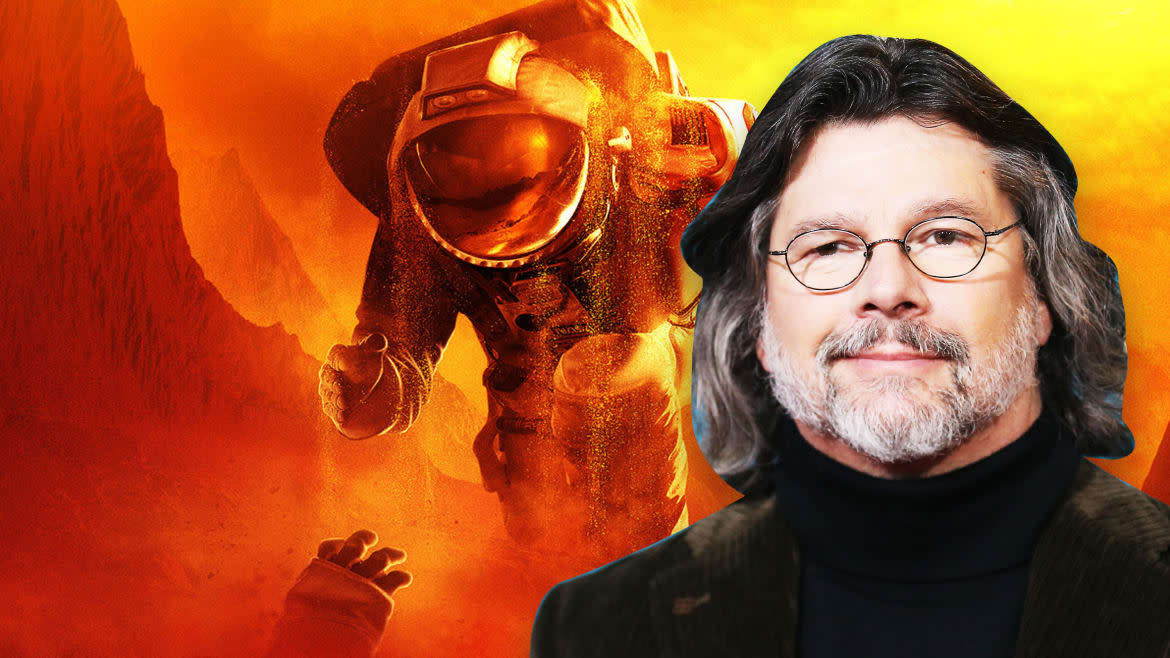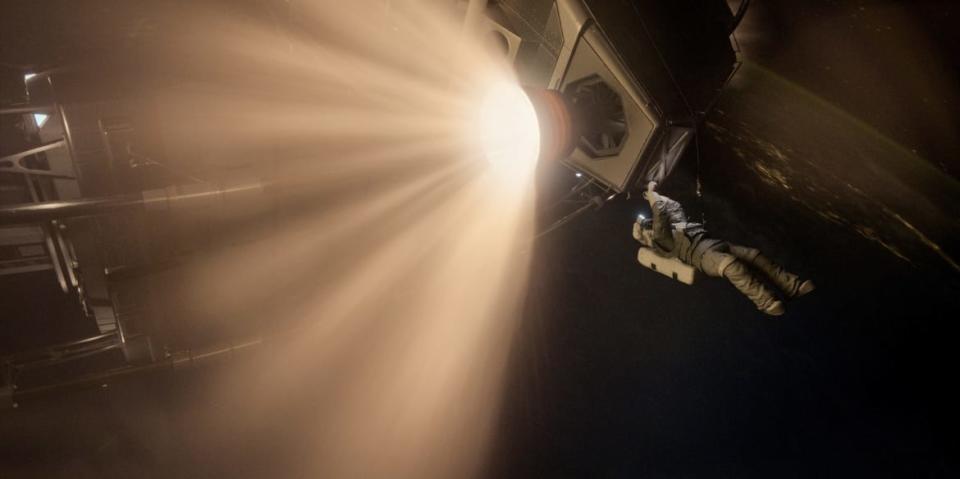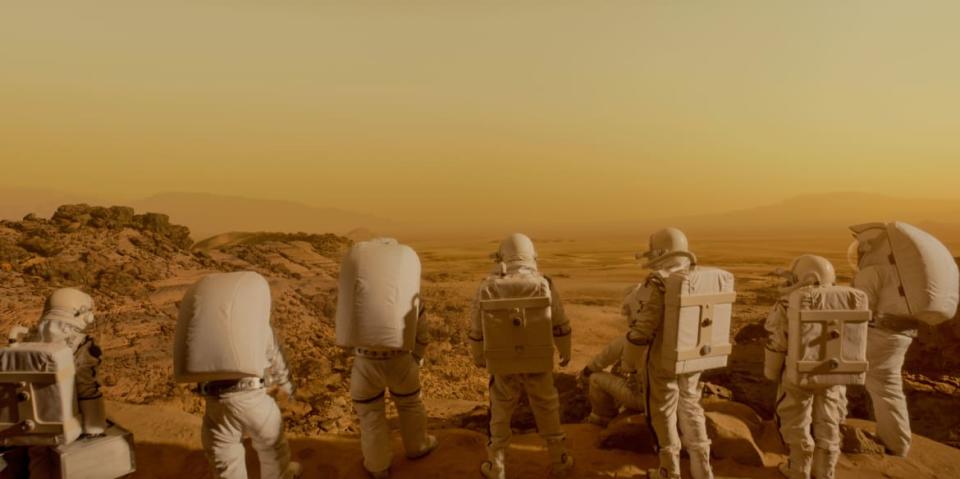Ronald D. Moore Made ‘For All Mankind’ and ‘Battlestar Galactica’ to Give Us Hope for the Future

- Oops!Something went wrong.Please try again later.
- Oops!Something went wrong.Please try again later.
When it comes to space—at least in Hollywood—there’s Ronald D. Moore, and there’s everybody else. Over the course of his distinguished career, the 57-year-old showrunner, writer and producer has been responsible for overseeing and/or creating some of science fiction’s most eminent and beloved works, from his renowned contributions to Star Trek: The Next Generation (and, after it, Star Trek: Deep Space Nine) to his triumphant reimagining of Battlestar Galactica, the latter of which earned him both a Peabody Award and an Emmy for Outstanding Writing for a Drama Series. Having also developed Starz’s ongoing historical romantic drama Outlander, Moore’s reputation is unimpeachable (and close to unparalleled) as a visionary able to infuse out-there tales with complexity, heart, and timely sociopolitical notions about our fraught modern world and the tomorrow we’re charting for ourselves and our descendants.
Moore is a master of fantastical sci-fi, but perhaps his finest achievement is his most Earthbound: For All Mankind, his current Apple TV+ series about an alternate timeline in which the Soviet Union beats the United States to the Moon, thus initiating a decades-long rivalry between the two nations to conquer the cosmos. Rooted in a recognizable reality even as it re-envisions America’s fortunes following its calamitous second-place finish, the show is a fascinating long-form exercise in “what if?” More importantly, though, it’s a celebration of ingenuity and ambition that’s populated by the most engaging and empathetic cast of characters on television.
‘Peaky Blinders’ Goes Out in Predictably Cool, Very Violent Fashion
In its upcoming third season (June 10), Moore and co-creators Matt Wolpert and Ben Nedivi fast-forward to the’90s to find the superpowers competing to reach Mars—a quest that’s complicated by a tech mogul (Edi Gathegi’s Dev Ayesa) with his own designs for the Red Planet. Rousingly speculative and inspiring, For All Mankind’s return solidifies its position as one of television’s absolute best. Consequently, we relished the opportunity to speak with Moore about crafting a believable alterna-history, what’s holding us back from greater space exploration, and whether we can entrust corporate billionaires with our intergalactic future.
Season 3 is set in the early 1990s, and opens with a montage that gets viewers up to speed on what’s happened in the show’s version of the past decade, and while some things are obviously different (Gary Hart has been president), others are the same (Michael Jordan, Nirvana). What’s the process behind deciding what stays and what changes?
It's a chaotic one. It’s a lot of throwing around ideas. It’s a long conversation in the writers’ room that kind of goes all season. There are usually a million ideas about what could change that get kicked around and go up on the board and come back on the board. There’s really no good rule of thumb for why we change certain events and some we don’t. Some we just think are cool and fun and interesting. Others have to do with our alternate history and following certain geopolitical stories along the way, and things that have to do specifically with the space program and the space program of the Soviet Union, and now the entrance of private enterprise into that. It’s literally an ongoing conversation, and the final montage is something that is one of the last things that’s finished. It tortures our post-production people until the very end, and it’s very complicated and difficult to pull off.

A scene from For All Mankind Season 3
Much of your sci-fi work has been more overtly fantastical than For All Mankind. What’s been the biggest adjustment, or challenge, in creating a show that’s wants to depict a “realistic” alternate history?
It’s a bigger challenge because in Star Trek, we did make references to the distant past, and Star Trek does have its own woven history through it that you had to pay attention to, but that was certainly malleable. For us, it was important that we wanted to say from the get-go: this could really have happened. That was a fundamental idea for us. We always tried to say, if the Russians got to the Moon first, a) how would that have been possible?, and b) what would be the impact? Then every step along the way, trying to have a realistic scenario for how that could have really occurred, and how would we move into space more aggressively, and in what kinds of ships, and what is the real science behind the science-fiction concepts. So even though some of these things are more speculative, like nuclear fusion, it’s based in reality and is something that is currently being talked about and that could actually work in the way that we’re talking about it. It does constrain you, but in a good way, because it gives you a tether to the real world and makes everything feel a lot more grounded.
Do you work closely with aerospace engineers to get the series’ ship designs and technological concepts right? Or is that an area where you can be a bit more imaginative?
We try to start from that point. We have real technical consultants; some are credited, some are not. Garrett Reisman is one of our key technical consultants, who was an actual astronaut. Garrett is our primary go-to source when we’re talking about these ships and how they would really work, and Garrett spends a lot of time figuring out the engineering on these things. We take liberties along the way, but again, we try to keep it tethered to reality. Garrett took the time to figure out, for the Polaris hotel at the beginning of Season 3, how fast is the rotation, and how big is the wheel, to generate 1 g. He found that it was going to spin too quickly for our dramatic purposes, because the view out the window to spin at 1 g was going to be so fast, it was going to almost make the audience sick. We had to say, well, we can’t just have it spinning that fast out the window at the beginning! So, with Garrett, we all discussed—OK, this is one of those things where we’re going to take dramatic license. But we knew what the science was, and it was still based in something very real.
Without getting into overt spoilers, Season 3 opens with a calamity. Do you think the monumental risk posed by space travel/tourism is what’s holding our space program back from being more daring?
The risks are real, and I think one of the things the show has said from literally the first episode is that we as a culture, and we as NASA as a representative of the public, have become way too risk-averse. Space travel is dangerous by its nature. You have to accept a certain amount of that. The way society reacted to the Apollo 1 fire, to the Challenger accident, to Columbia, has now made government-sponsored space travel so risk-averse and so terrified of ever having accidents that it really constrains our ability to do big things. Part of the show has said, from the get-go, there’s going to be tragedies. Things are going to happen. It’s going to be bad. But we shouldn’t overcorrect to the point where we just can’t fly anymore, which is almost where we are today.
Is that what you blame for NASA’s decision to pull back from space exploration, which has allowed private-sector forces to take the lead?
In my personal opinion, I think that is definitely a large factor. There’s also public interest. There’s funding problems. And I think there’s the way that NASA, as a public agency, has to respond to the shifting political winds of Congress and an administration, which complicates everything. But fundamentally, it does feel like it’s a combination of lack of public interest, which waned after the Apollo missions, and NASA’s risk-averse nature, which then constrains everything and makes it much, much more difficult to just fly, and much more difficult to design new spacecrafts and to test them and just to do it as a regular thing. If you think about the military, the sad truth is that we lose pilots, and we lose men and women, every day in peacetime and in the best of circumstances, because it’s an inherently dangerous business. But you don’t stop the military from building aircraft carriers all of a sudden. You just go, this is part and parcel of what happens, it’s tragic, but we accept that. We accept the cost, and we accept the risk of doing that, because we feel like the goal is worth it.
That, of course, brings us to Dev (Edi Gathegi), the billionaire who enters into the show’s U.S.-Soviet space race. Dev has elements of Mark Zuckerberg and Elon Musk, but was there a clear model for him? And moreover, is private-sector involvement in space travel a net positive?
We specifically said we did not want to model Dev on any of those people. We didn’t want him to turn into a caricature of any of those men, or a combination of any of them, because that just felt like a distraction, and isn’t really what the show is about. Nonetheless, it is part of reality, and it’s also a realistic way, obviously, for private entities to get involved in space travel. So, it felt right that it should be part of the show. One of my earliest conversations with Garrett was at SpaceX, because he was working at SpaceX, so it was always baked into the concept that private enterprise was going to enter this arena at some point in our story—it was just a question of when, and under what circumstances. I feel like, in the real world, it is a net positive. SpaceX and Blue Horizon are both working with NASA in very positive ways, and have actually moved the state of technology forward and are making actual advances. Are there downsides? Sure. There are downsides with everything. I personally thought that sending Bill Shatner into space was an amazing thing! It warmed the hearts of a lot of people, and I think that was wonderful. I refuse to look at that and say that it’s a negative thing. I think it was wonderful and inspiring and really great.
Still, as the show itself asks, is the trade-off for these advances that we have to cope with the fact that corporate interests are different than those of governmental bodies?
Sure, because we’re still people. I think there’s good and bad to everything, and you have to decide, in the end, what is worth certain costs, what is worth certain risks, what is worth certain negative consequences. If we keep our eyes on the prize, I feel like where we’re trying to get to, and what these things can ultimately benefit for all mankind, is worth the fact that some of this stuff is stupid, and some of this stuff is wasteful, and some of this stuff has negative connotations to it. Because I think it’s a bigger arc, and a bigger story, in our progress.

A scene from For All Mankind Season 3
No matter the timeline, is Russia always going to be our enemy? Can you imagine a future in which they’re not?
I think the arc of the show is certainly talking about more cooperation between the two superpowers as time goes on, even though, again, there are setbacks and problems and misunderstandings and nefarious things that happen. But the arc of the show is trying to say that there is a more positive future for both the United States and the Soviet Union as they cooperate in space, and as they move forward in a fractured and difficult partnership that at times breaks apart and at times is sewn back together. That ultimately, there is a better path forward.
That hopefulness extends to the show’s overarching belief in humanity’s capacity for evolution and progress. Do you see For All Mankind as deliberately inspirational?
Yes, it is. That was part of the pitch of the show: we wanted an optimistic view of the future that could be, and here’s a way we could have gotten there in the past and, by implication, the way that we still can get there. I make no bones about the fact that my personal history with Star Trek as a child, and then later as a professional, has influenced my point of view and my optimism. I want to believe in a better future. I want to believe in cooperation. I want to believe in space travel as a positive thing. And I wanted very much for this show to say that to people, and yes, to inspire people—if possible—to lift their eyes to dream bigger dreams. I think that’s part of what we’re trying to do.
William Shatner Wants Elon Musk to Save the Earth
Relatedly, For All Mankind is less about traditional genre conflicts than about a sense of wonder about space, and about our ability to accomplish tremendous feats. Is that also central to the way in which you chart its course?
Science fiction can be a great lens on society, and can talk about a lot of different things. I think too often, science fiction is used to paint a dystopian future and to say things are going to suck. It’s really going to be bad in the future, and it’s going to be horrible! In a lot of ways, that’s sort of an easy route to take as a writer. It’s easy to write about terrible, terrible things and really awful situations. It’s a little bit harder to come up with things that look brighter, and that are a little more hopeful, because you run the risk of people saying you’re naïve or you’re too earnest or what have you. Everyone feels, I don’t want to be naïve! I’d rather be cynical and dark.
I have no problem with Blade Runner or Alien—I love those movies. I think that’s fantastic. But there should be other flavors, and it feels like this is a show that takes an opportunity to say something positive. That tries to say something positive about not just an imagined future but about our present. About the things we’re capable of doing. By showing an alternate history to these characters, and what we could have done, it is saying, very much, we can still do those things. We can still make these decisions. We can still make these choices. We can still decide to go after a bigger dream. We can still decide to cooperate with people who might seem like our enemies. We can still decide that there are ways to solve our energy crises through technology and through being smart and caring about these things and each other. And I think, why not take that opportunity if you have it.
Get the Daily Beast's biggest scoops and scandals delivered right to your inbox. Sign up now.
Stay informed and gain unlimited access to the Daily Beast's unmatched reporting. Subscribe now.

